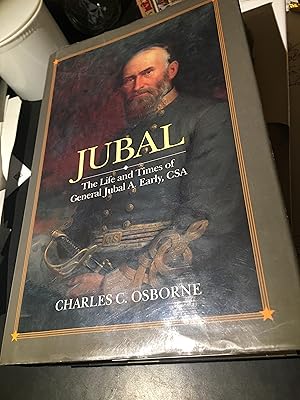Synopsis
Here at last is the definitive biography of one of the most combative and colorful military commanders of the American Civil War.
Jubal A. Early was a diehard Unionist who battled tooth and nail to keep Virginia from seceding and joining the Confederacy, but once the fighting started he swiftly became one of the South's most hard-hitting generals.
He won high praise from Stonewall Jackson and Robert E. Lee, who came to count on his sound military judgment and his fighting spirit. At First and Second Manassas, Antietam, Fredericksburg, and Chancellorsville he fought hard and well.
As a general he was outspoken and opinionative. Historians still argue the pros and cons of his controversial role in the Confederate defeat at Gettysburg. But when Lee wanted to threaten Washington and take some of the pressure off the Army of Northern Virginia defending Richmond in 1864, it was Early whom he chose to lead an army down the Shenandoah Valley.
Early got closer to the Union capital than any other Confederate general during four years of war, reaching the very gates of Washington itself. He fought and licked Phil Sheridan's far larger force in the Shenandoah Valley - only to experience disaster when Sheridan rallied his fleeing troops and smashed the overconfident and seemingly victorious Confederates.
In the end he knew defeat and humiliation. His little army fell apart, the Confederate authorities lost all confidence in him, and he rode southward in the rain, a beaten general. After Lee's surrender he fled south of the border, vowing never to live in a conquered South.
Eventually he returned home to Virginia, where he spent his final decades practicing law, fronting for the Louisiana Lottery, engaging in violent public disputes with some of his former comrades over who was to blame for the Confederate defeat, and participating in veterans activities. Unreconstructed and unreconciled, outspoken, argumentative, he remained a colorful and sardonic presence on the American scene until his death.
In this first modern biography of a major Civil War figure, Charles C. Osborne has made an important contribution to military history and to our understanding of the Old and New South. Vividly told and thoroughly researched, with detailed maps of the battles and campaigns, here is a book that every Civil War buff and military historian will want to read and own.
Reviews
This well-written, comprehensive biography comes as close as is perhaps possible to a sympathetic treatment of the controversial Confederate (1816-1894). While acknowledging Early's post-Civil War role in creating the mythology of the "lost cause," Time-Life Books editor Osborne focuses on his subject's military career. He depicts Early as an extremely competent brigade and division commander who proved only adequate at corps level and a failure as an independent commander in the Shenandoah Valley. Conceding that Union material superiority was so great by 1864 that no one was likely to have performed any more effectively than Early, Osborne stresses the general's egocentricity and bitter, sardonic personality, traits that increasingly sapped his confidence and diminished his capacity to work with both superiors and subordinates. Marred somewhat by an unconvincing conclusion--that Early's behavior was shaped by a "deep fear of his softer side"--this is nevertheless likely to remain the definitive study of "Old Jube."
Copyright 1992 Reed Business Information, Inc.
In the spate of Civil War books that flood the market each year, it is a wonder that no one has produced a full-scale, modern biography of Early. Thanks to veteran journalist Osborne, we now have a well-written and balanced account of Early's life and career that will appeal to general readers and scholars alike. Osborne explains the source of Early's extraordinary ambition, describes his antebellum political career, including his antisecessionist vote in the 1861 Virginia convention, and traces his development throughout the war into the bitter and unreconstructed rebel he always remained. The bulk of the book consists of Osborne's careful campaign history, for Early fought with Lee and the Army of Northern Virginia until he received an independent command in 1864. All the controversies that surrounded Early--about Gettysburg, the raid on Washington, and Cedar Creek--are handled in a judicious manner. Perhaps the most intriguing part of the book is Early's postwar machinations to elevate Lee to secular sainthood and to create the myth of the Lost Cause. Osborne does justice to a fascinating life. For public and academic libraries.
- David B. Mattern, Univ. of Virginia, Charlottesville
Copyright 1992 Reed Business Information, Inc.
"About this title" may belong to another edition of this title.

